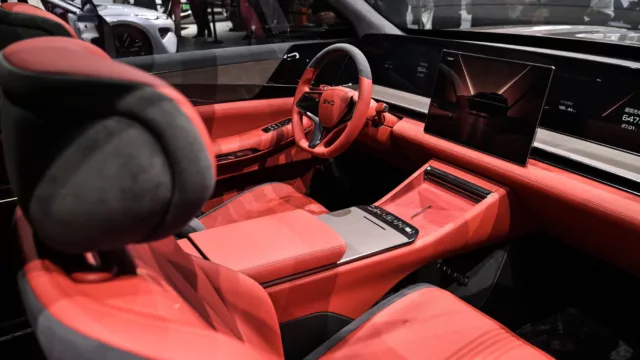
Chinese brands are reshaping the global marketplace and extending their influence among international consumers — even as US tariffs cast uncertainty over the year ahead.
BYD’s electric vehicle sales have overtaken Tesla’s in Europe, and in Brazil seven out of 10 fully electric cars sold are made by BYD. Xiaomi, the world’s third-largest phonemaker, which has put its logo on everything from suitcases to smart washing machines, just added EVs to its list of planned exports. And this year’s must-have handbag accessory, the Labubu doll, is a Chinese export by Pop Mart, which generates almost 40 per cent of its sales outside China.
According to agencies focused on Asia-Pacific brands, the number of Chinese companies pursuing international sales and entering new markets has grown significantly over the past 18 months. “There’s been a pretty massive acceleration led by companies seeking growth outside of China — a highly competitive market where growth has slowed,” says Chris Reitermann, chief executive of Ogilvy Asia-Pacific and China president at WPP.
He adds that the shift towards ecommerce outside China has made it easier for Chinese brands to expand abroad without having to spend large sums on distribution. Equally, Chinese companies tend to be much more digital-focused and quick to incorporate artificial intelligence, which is reflected in their spending on digital marketing. “Platforms like TikTok and Facebook have been key to Chinese brands expanding abroad,” he adds.
Ami Qian, chief transformation officer and head of client business at Japanese agency Dentsu, says Chinese companies’ overseas expansion has led to the “Chinese way” of digitally focused brand-building becoming more defined.
Last summer, the Paris Olympics and the Euro 2024 football tournament provided valuable opportunities for Chinese companies to boost their global profile. While Mengniu, the dairy company, and ecommerce group Alibaba have long-term sponsorship deals in place, newer sponsors included smartphone maker Vivo and BYD.
Smaller brands, such as drinks companies Heytea and Chagee, set up tea rooms to entice Olympic spectators. At Euro 2024, five of the 13 official global sponsors were Chinese: BYD; Ant Group, the parent of Alipay; Vivo; television manufacturer Hisense; and AliExpress, Alibaba’s ecommerce arm, which also appointed former England footballer David Beckham as a brand ambassador for the competition.
Reitermann, who has worked with Chinese companies for more than 20 years, says brands such as BYD, which are gaining significant global recognition and awareness, are just starting their branding journey. BYD’s marketing is based around “telling consumers about specific features” of the product rather than building the brand, he says. While the cars are relatively new and “super competitive” now, when the product is more established and perhaps less competitive, branding will help by having built loyalty among consumers.
China’s global relations are a factor driving which markets brands are targeting. “They tend to go where there is less friction, where China has friendly relations,” says Scott Spirit, chief growth officer and executive director at marketing agency S4 Capital.
That is the reason for the shift to the Middle East, Brazil, Indonesia and south-east Asia — where a few years ago Germany, the UK and Italy would have been the main focus. “The market sellers in Yiwu are all learning Arabic and Spanish now,” Spirit adds, referring to the vast wholesale market in China’s Zhejiang province.
Last year, Alibaba’s fastest-growing division was international ecommerce, which includes platforms such as AliExpress, Lazada (south-east Asia), Daraz (south Asia) and Trendyol (Turkey). This year the group is pivoting towards AI and cloud services, but Alibaba remains the second-highest ranked global Chinese brand, at 29th out of 100 global brands, according to Kantar.
Tencent holds the highest ranking, at 11th. The tech giant scored a brand win earlier this year when its WeChat platform was removed from the US Trade Representative’s list of counterfeit sellers, which it had been on since 2022. Danny Marti, head of public affairs and global policy at Tencent and intellectual property (IP) tsar under the Obama administration, says the removal recognised WeChat’s progress in IP protection.
WeChat recently published a brand protection report for 2024 with details of how users report IP infringements in private chats and groups. “IP protection for the brands on our platforms is something we take seriously,” Marti says.
Tencent’s broader brand recognition stems from its role as a major investor, creator, producer, distributor and licenser of TV, video, film, games, books and comic books, he adds. “Everything we do is dependent on a strong, well-functioning IP system within a regulatory framework. Effective IP protection underpins Tencent’s entire business model,” Marti says.
Marti is optimistic about the global outlook for Chinese brands. “Consumers everywhere want high-quality content, great products and great user experience. Asia is home to most of the world’s population and the digital era has fundamentally shifted global influence,” he says. “It’s no surprise we’re seeing Asian brands in global markets. Why wouldn’t there be if they bring innovation and creativity that consumers value?”









